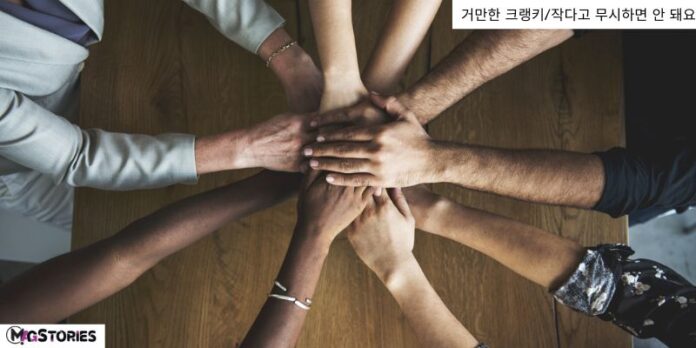The Korean saying 거만한 크랭키/작다고 무시하면 안 돼요 (Don’t underestimate the small or arrogant) has been apt and relevant even in modern times. This proverb emphasizes the importance of not judge a person by his/her external traits since there are often hidden qualities or abilities that are not visible at the first glance. Exploring the core of this ancient knowledge reveals insightful concepts that influence individuals, communities, and workplaces.
The Essence: Transcending Appearances
It simply explains that one should not come to conclusions about situations or persons just by looking at them. This saying teaches us that knowing our potential and the potential of things may save us from missing out or facing unnecessary consequences.
The idea behind ‘거만한 크랭키/작다고 무시하면 안 돼요’ cannot be limited to the breadth of its lexical meanings – it also represents a deeply rooted value within Korean society. This proverb teaches us to be curious and critical, to learn to think beyond common sense, and to liberate our minds from preconception.
Perceptions and Cultural Nuances
Judgment involves our perceptions, both conscious and unconscious, to form perceptions about people, ideas and events. In order to fully appreciate the concept of underestimation, it is important to understand its psychology and the cultural influences on cognition.
This proverb is relevant in the modern world due to the high number of cross-cultural interactions become more widespread. Being culturally sensitive helps to avoid unintentional disrespect and helps to establish an open dialogue between cultures.
Lessons from History: Underestimation’s Consequences
At various times in history, ignoring the apparently trivial or the outwardly unrestrained has usually resulted in major long-term implications. Real-life stories that range from failed business deals to misunderstandings between countries are perfect examples of how people usually underestimate danger.
From seeing these historical examples, it becomes clearer as to why the proverb still applies and the significance of having a mindset that is open-minded to change.
Nurturing Relationships: Overcoming Underestimation
In the personal and professional lives, it is rather destructive to underestimate others. Negotiation, respect, and empathy are essential ingredients of positive relationships.
Exploring these dynamics reveals how underestimation can be prevented or mitigated. Being open-minded, being active listeners, and trying to understand the other person’s perspective can lead to strong and meaningful relationships.
Cultivating Diversity: A Path to Growth
The appreciation of the importance of diversity is a crucial step towards becoming an individual and a nation. These diverse viewpoints push you to broaden your perspectives, fight your prejudices, and improve your perception of the world.
Through integrating diversity into our daily lives, we allow more learning opportunities, creative and innovative ideas, as well as deeper knowledge of the world and humanity. This mentality not only supports personal development but also contributes to the positive development of our communities and societies as a whole.
Building Tolerance: A Collective Responsibility
There is a need for individuals and institutions to work towards eliminating biases and promoting inclusivity. The need for tolerance and acceptance is a shared responsibility requiring mutual efforts.
Schools have a critical role in setting perceptions and practices from an early age. Schools can help set up the groundwork for a more tolerant and equal society if they encourage inclusive curricula and provide a sense of respect for all.
Challenging Stereotypes: Breaking Free from Limitations
Underestimation is closely connected to stereotypes and causes the reproduction of biases and blocks the development of people and society. We need to actively work towards deconstructing these notions for a more fair and just world.
One of the ways in which this can be achieved is through the promotion of critical thinking, discussion of controversial issues, and the use of multicultural themes in teaching. This process not only frees people from the bonds of prejudice but also leads to greater creativity and inclusiveness.
Fostering Confidence: Empowering Resilience
Presenting oneself as unstoppable necessitates the development of self-efficacy and more. By practicing self-empowerment skills one can defend one’s worth in a respectful way without allowing self-doubt or forcefulness to take over.
Mentorship programs, leadership development programs, and supportive communities are crucial as they contribute to the establishment of confidence and empowerment of individuals to face life challenges and realize their potential.
Business Implications: Staying Ahead of the Curve
In the fast-paced business world, the risks of underestimation can be severely detrimental. An objective competitor analysis and a commitment to learn from mistakes are critical for preventing major mistakes.
It is possible to ensure that businesses remain relevant by creating opportunities that meet the changing market trends through a growth mindset and learning culture. This approach not only increases competitiveness but also encourages innovation, diversity, and people working together.
Embracing Lifelong Learning: A Path to Wisdom
Ultimately, the proverb “거만한 크랭키/작다고 무시하면 안 돼요” encapsulates a universal truth: The path to wisdom requires being teachable and open to change.
Through setting a growth mindset and pursuing a lifelong learning mentality, it is possible to overcome the underestimation trap and enable the best possible development. It does not only improve our private lives but also promotes the progress of all nations and humanity.
Conclusion: Embracing Timeless Wisdom
This Korean proverb “거만한 크랭키/작다고 무시하면 안 돼요” is a real proof that our forefathers were not as foolish as we might sometimes think. It is universal and timeless and inspires people to think critically about the world around them and cherish diversity.
Through understanding the meaning of this proverb we can be able to deal with the complexities of human relationship and interactions with our fellow human beings. Let us se this ancient truth and work towards building a world in which acceptance and love will shape a just world for everybody.





